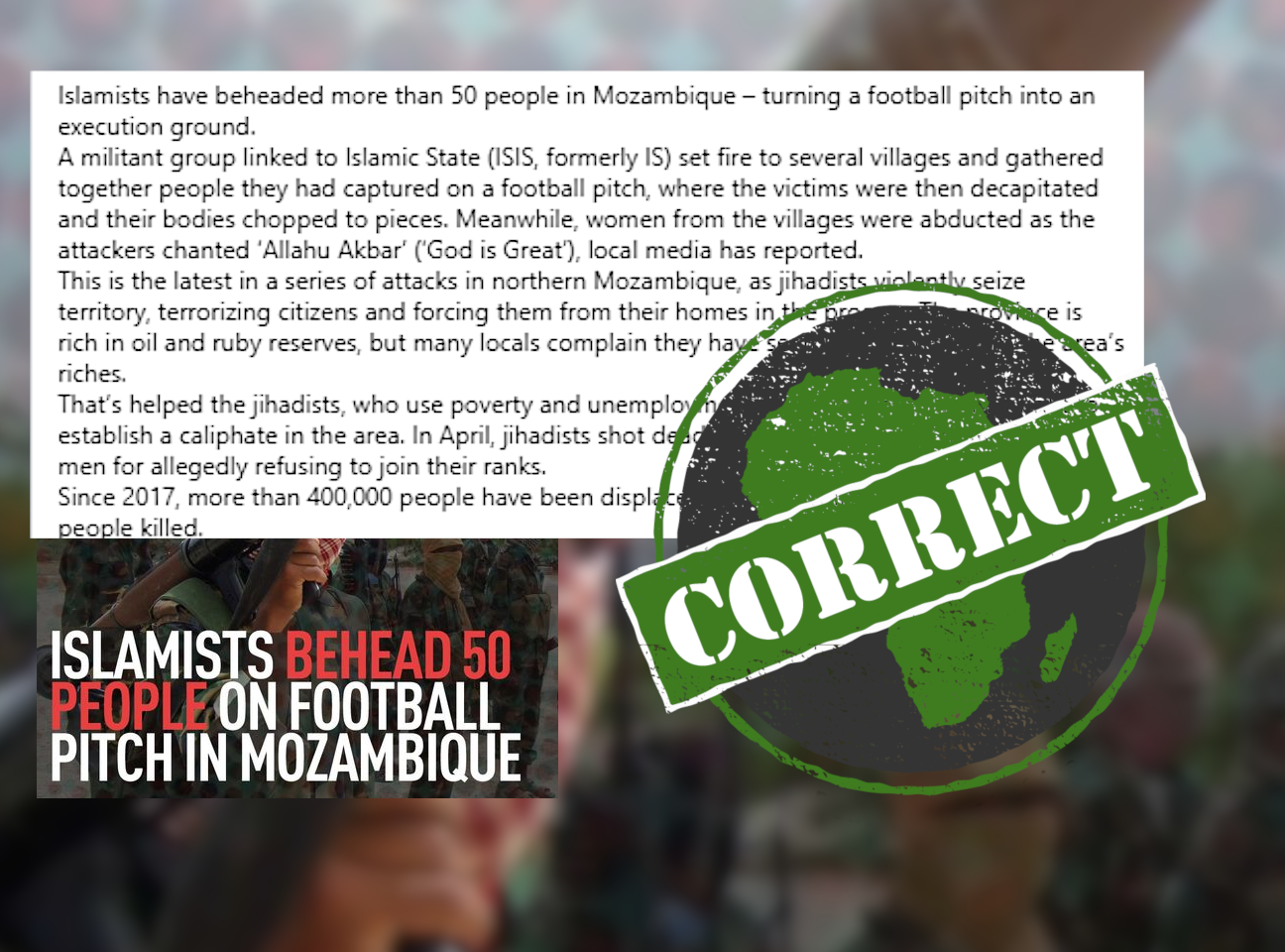Have “Islamists” beheaded over 50 people in Mozambique, “turning a football pitch into an execution ground”?
That’s the claim in a post shared on Facebook by Russian TV channel RT in November 2020, attracting hundreds of thousands of views.
The post describes the events in gruesome detail, gory enough to alarm users on Facebook who flagged it as possibly false to the platform’s fact-checking system.
The post says the militants razed several villages and rounded up captives on a football pitch. The attackers then decapitated their victims before chopping their bodies to pieces.
Could the post be made up?

The first clue that the reports may be credible is that RT’s account is verified. Verified pages will display a blue check mark, indicating that Facebook has confirmed that the page is “the authentic Page or profile for this public figure, media company or brand”.
According to its website, RT has been in operation since 2005, and broadcasts in various languages from bureaus in cities such as Washington, London and Paris.
But even credible organisations can make mistakes. Further evidence that the disturbing incident took place is in the wide coverage by other reputable organisations.
These include the BBC, which reported on the massacre two days before RT, crediting Mozambican state media. Others were newswire AFP and international media houses such as the New York Times.
The attack is not the first. In April a similar number of victims were reported killed in the same area of northern Mozambique. The region has been under attack since 2017, with more than 300,000 people displaced.
The attackers are said to be linked to the Islamic State group, giving it a foothold in southern Africa. They have reportedly tapped into local grievances.
The Southern African Development Community has said the crisis is a threat to the entire region. – Africa Check
That’s the claim in a post shared on Facebook by Russian TV channel RT in November 2020, attracting hundreds of thousands of views.
The post describes the events in gruesome detail, gory enough to alarm users on Facebook who flagged it as possibly false to the platform’s fact-checking system.
The post says the militants razed several villages and rounded up captives on a football pitch. The attackers then decapitated their victims before chopping their bodies to pieces.
Could the post be made up?

‘Threat to the region’
The first clue that the reports may be credible is that RT’s account is verified. Verified pages will display a blue check mark, indicating that Facebook has confirmed that the page is “the authentic Page or profile for this public figure, media company or brand”.
According to its website, RT has been in operation since 2005, and broadcasts in various languages from bureaus in cities such as Washington, London and Paris.
But even credible organisations can make mistakes. Further evidence that the disturbing incident took place is in the wide coverage by other reputable organisations.
These include the BBC, which reported on the massacre two days before RT, crediting Mozambican state media. Others were newswire AFP and international media houses such as the New York Times.
The attack is not the first. In April a similar number of victims were reported killed in the same area of northern Mozambique. The region has been under attack since 2017, with more than 300,000 people displaced.
The attackers are said to be linked to the Islamic State group, giving it a foothold in southern Africa. They have reportedly tapped into local grievances.
The Southern African Development Community has said the crisis is a threat to the entire region. – Africa Check
Republish our content for free
For publishers: what to do if your post is rated false
A fact-checker has rated your Facebook or Instagram post as “false”, “altered”, “partly false” or “missing context”. This could have serious consequences. What do you do?
Click on our guide for the steps you should follow.
Publishers guideAfrica Check teams up with Facebook
Africa Check is a partner in Meta's third-party fact-checking programme to help stop the spread of false information on social media.
The content we rate as “false” will be downgraded on Facebook and Instagram. This means fewer people will see it.
You can also help identify false information on Facebook. This guide explains how.


Add new comment